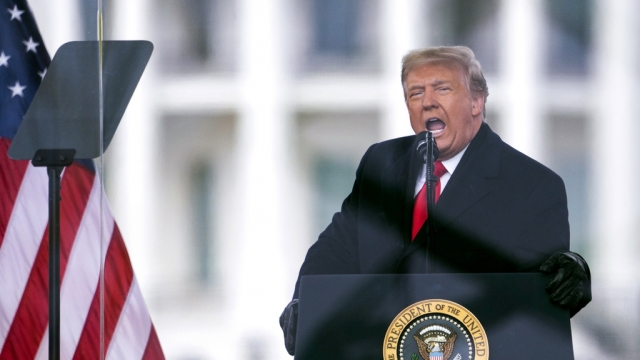The U.S. Supreme Court heard arguments for over two hours Thursday on whether state officials can ban former President Donald Trump from appearing on their election ballots.
Voters in numerous states challenged Trump's eligibility for the ballot, citing the 14th Amendment's insurrection clause. The amendment, which was ratified three years after the end of the Civil War, says:
"No person shall be a Senator or Representative in Congress, or elector of President and Vice-President, or hold any office, civil or military, under the United States, or under any State, who, having previously taken an oath, as a member of Congress, or as an officer of the United States, or as a member of any State legislature, or as an executive or judicial officer of any State, to support the Constitution of the United States, shall have engaged in insurrection or rebellion against the same, or given aid or comfort to the enemies thereof. But Congress may by a vote of two-thirds of each House, remove such disability."
This wording faced intense scrutiny from attorneys for Trump and the Supreme Court. Trump attorney Jonathan Mitchell faced numerous questions on the definition of an "officer."
Justice Sonia Sotomayor said excluding the president as an officer is "a gerrymandered rule designed to protect your client, right?”
"I certainly wouldn't call it gerrymander. That implies nefarious intent," Mitchell responded.
Jason Murray, an attorney for Colorado Votes, spoke on behalf of removing Trump from the ballot. He faced questions over how states would decide whether a candidate is an insurrectionist.
"Suppose there's a country that proclaims again and again that the United States is its biggest enemy ... could a state determine that that person has given aid and comfort to an enemy?" Justice Samuel Alito asked. "Would we have to have our own trial?"
Murray said a court could look at evidence and decide.
Trump protested the results of the 2020 presidential election naming Joe Biden as the winner and held a rally moments before his supporters stormed the U.S. Capitol during the counting of Electoral College votes, disrupting the proceedings.
Some of Trump's opponents claim that Trump's actions leading up to the insurrection at the Capitol would make him ineligible to serve as president under the 14th Amendment. In December, Colorado became the first state to ban Trump from the state's primary ballot.
Some states said they would wait for the Supreme Court ruling before deciding whether to allow Trump on their ballots.
SEE MORE: Lawmakers react to Colorado barring Trump from its primary ballot
Another key argument by Trump is that simply Trump was simply not "engaged" in an insurrection of the U.S. Trump's lawyers also argue Congress, and not the states, are responsible for upholding the insurrection clause. Another argument is that the 14th Amendment only prevents someone from holding office, not seeking office.
The State of Colorado responded that states have broad powers to regulate elections, which officials say allows them to exclude constitutionally ineligible candidates from the ballot.
The state added that Trump violated his oath of office by not engaging in a peaceful transfer of power when he lost the election.
"He betrayed that oath," the state argued in its brief. "He refused to accept the will of the over 80 million Americans who voted against him. Instead of peacefully ceding power, Trump intentionally organized and incited a violent mob to attack the United States Capitol in a desperate effort to prevent the counting of electoral votes cast against him."
During Thursday's hearing, the court largely shied away from questions over whether Trump actually engaged in an insurrection. Many questions by the justices focused questions on due process, and what happens if one state says a candidate engaged in an insurrection, while another doesn't.
Colorado Secretary of State Jena Griswold also answered questions. She said states had an obligation to decide ballot access.
Given that the Republican primaries have already started, it is likely the Supreme Court will issue an expedited ruling, which could come within weeks.
Trending stories at Scrippsnews.com




